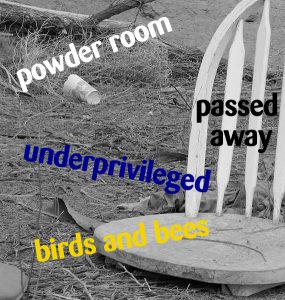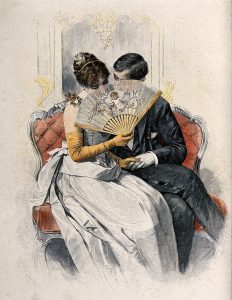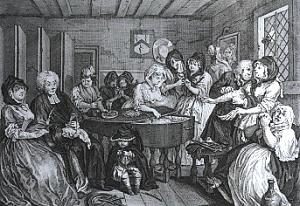 It’s my birthday today! So I thought I’d treat myself by blogging one final time about semantics: the meanings of words, how they change and what that says about us as a society. I love semantics! If you’re interested to know about the words ‘fear’, ‘worm’, ‘starve’, ‘bachelor’, ‘honest’ and ‘pretty’ then click below to read more about them:
It’s my birthday today! So I thought I’d treat myself by blogging one final time about semantics: the meanings of words, how they change and what that says about us as a society. I love semantics! If you’re interested to know about the words ‘fear’, ‘worm’, ‘starve’, ‘bachelor’, ‘honest’ and ‘pretty’ then click below to read more about them:
Words Reveal Who We Really Are
Today, though, I thought I’d finish off this little series with a word or two about taboo words and how quickly they can change. Society has a need to speak of unpleasant or taboo subjects discreetly and indirectly, and this generates a need for words that can replace the more blatant and frank taboo terms for subjects like death, sex, defecation, class, age, health and economic collapse. Thus ‘passed away’ replaces ‘dead’, ‘birds and bees’ replaces ‘sex’, ‘powder room’ replaces ‘toilet’, ‘underprivileged’ instead of ‘poor’, etc.
After a while, however, overuse of such substitute words, or ‘euphemisms’, can result in their becoming as taboo as the words they replaced. Their close association with a certain subject eventually extends to render it the subject’s actual term of reference, and creates the need for another to replace it. It’s a throw-away culture! (Otherwise know as ‘pejoration’.)
 Take the word ‘lust’ for example. The earliest definition of ‘lust’ in the Oxford English Dictionary is ‘pleasure, delight; desire, appetite’ – it referred to any source of pleasure or delight. Slowly, however, its meaning was narrowed to ‘desire relating to sexuality’, and was then repeatedly applied to ‘sinful’ sexual desire as a euphemism. After a while, this continual association meant the word became too direct for delicate conversation, and eventually came to imply sexuality unfavourably. Thus its Modern English meaning is ‘sexual desire or appetite, implying intense moral reprobation’.
Take the word ‘lust’ for example. The earliest definition of ‘lust’ in the Oxford English Dictionary is ‘pleasure, delight; desire, appetite’ – it referred to any source of pleasure or delight. Slowly, however, its meaning was narrowed to ‘desire relating to sexuality’, and was then repeatedly applied to ‘sinful’ sexual desire as a euphemism. After a while, this continual association meant the word became too direct for delicate conversation, and eventually came to imply sexuality unfavourably. Thus its Modern English meaning is ‘sexual desire or appetite, implying intense moral reprobation’.
Likewise, ‘hussy’ once meant ‘the mistress of a household, housewife’, and in some rural districts was a mere equivalent of ‘woman’. But then came to mean ‘a rustic, rude, opprobrious or playfully rude mode of addressing a woman’ because it was used to refer to mistresses of lower class households and, because being described as low was an insult, ‘hussy’ came to refer to women in a jocular / insulting sense. The jocular tone was then dropped to render the word an insult, and finally it was ‘specialised’ once more to the meaning of sexually low. For a time it was used as a euphemism to refer to sexuality indirectly for a time, but then its associations extended to make the word a firmly unfavourable and derogatory one, such that it is now a derogatory term meaning ‘an impudent or immoral girl’.
 Similar changes happened to the words ‘collaborator’, ‘lewd’, ‘gaudy’, ‘silly’ and ‘harlot’. ‘Harlot’, for example, once meant ‘a vagabond, low fellow’ (ie. a low male), but has since been (1) specialised to ‘a man of loose life, a fornicator’ (ie. a sexually low male), (2) generalised to ‘unchaste persons of both sexes’ (ie. any sexually low person), and finally (3) specialised again to the derogatory ‘a prostitute, a strumpet’ (ie. sexually low female). The reason again being a demand for fresh untainted words to refer to tainted subjects.
Similar changes happened to the words ‘collaborator’, ‘lewd’, ‘gaudy’, ‘silly’ and ‘harlot’. ‘Harlot’, for example, once meant ‘a vagabond, low fellow’ (ie. a low male), but has since been (1) specialised to ‘a man of loose life, a fornicator’ (ie. a sexually low male), (2) generalised to ‘unchaste persons of both sexes’ (ie. any sexually low person), and finally (3) specialised again to the derogatory ‘a prostitute, a strumpet’ (ie. sexually low female). The reason again being a demand for fresh untainted words to refer to tainted subjects.
Though it’s not as common, words can also undergo what’s called ‘amelioration’, where they acquire favourable implications and/or lose any unfavourable ones. For example, ‘success’ has changed from the descriptive meaning of ‘result’ to the more positive ‘favourable outcome’; ‘noble’ has changed from ‘belonging by rank, title or birth to the aristocracy’ to the complimentary ‘magnanimous, excellent, admirable’; and ‘lady’ from ‘a female head of a household’ to the flattering ‘a woman whose manners, habits and sentiments have the refinement characteristic of the higher ranks of society’.
With today’s gradual relaxing of attitudes towards sex, words such as ‘hussy’ and ‘harlot’ will probably soon be entirely ameliorated to a jocular (even affectionate) sense. They will lose the intensity they once possessed, similar to the word ‘awful’. ‘Awful’ once meant ‘inspiring awe and reverence’ but downgraded to ‘unpleasant, frightful’ around the nineteenth century. The degree of intensity the word reflects today is far less than the intensity it would have implied a few hundred years ago. It has been dulled through constant use to emphasize or exaggerate circumstances, make them appear worse or better than they were, and repeated use of the word in such a context has gradually lessened its impact over time. Other words whose loss of intensity can be attributed to exaggeration include ‘full’, ‘right’, ‘dismal’, ‘frightful’, ‘presently’, ‘quell’, ‘nice’, ‘monstrous’ and ‘hellish’.
 With the meanings of so many words changing along with their intensity, I suppose it’s no wonder that when I was at university reading Chaucer (“The Canterbury Tales”) and Malory (“The Tales of King Arthur”) I had to keep one finger on the page I was reading and another in the glossary! Written in the 1300s and 1400s, their English was very different to mine! Until I learnt ‘Middle English’ I had to flip back and forth just to understand what I was reading. Now that I’m a teacher of creative writing and social media, I often get asked about text-language, the Twitterverse and other forms of emerging literacies. I’ve even taken part in an experiment designed to explore the future of language, given our semiotic landscape is becoming so dominated by the visual. If something is TL;DR TBH who can be bothered ALOL?!
With the meanings of so many words changing along with their intensity, I suppose it’s no wonder that when I was at university reading Chaucer (“The Canterbury Tales”) and Malory (“The Tales of King Arthur”) I had to keep one finger on the page I was reading and another in the glossary! Written in the 1300s and 1400s, their English was very different to mine! Until I learnt ‘Middle English’ I had to flip back and forth just to understand what I was reading. Now that I’m a teacher of creative writing and social media, I often get asked about text-language, the Twitterverse and other forms of emerging literacies. I’ve even taken part in an experiment designed to explore the future of language, given our semiotic landscape is becoming so dominated by the visual. If something is TL;DR TBH who can be bothered ALOL?!
(if something is too long to be read, then to be honest who can be bothered to read it, ha ha?!)
Given the effect new technologies are having on our language, the rate of change for word meanings may even increase, such that we may struggle to understand literacies spoken or written in fifty years time.
In the end, though, it’s up to us – it is a language’s users who decide what words mean, and will mean. If we as a culture like a particular figurative expression, or a new euphemism, then that meaning will be incorporated into our language. No single person can eradicate a word or meaning that the general populace has accepted. Only time can do that. Society is constantly evolving, so too is our language. And if a word no longer has current meaning, it will either undergo change or get thrown away. So use the words you want to prevail as frequently as you can and, since kenching can lead to brabbles, do up your britches before gallivanting at twitter-light brannigan hootenannies!
laughing at people can lead to fall-outs, so ensure your trousers are done up before hanging out at boozy twilight karaoke!






Ah, birthdays. 😉 Hope it was a good one. 🙂
Thanks Robert! Yes, it was great – got the kids/Hubbie to cook me dinner and wash up!! 🙂